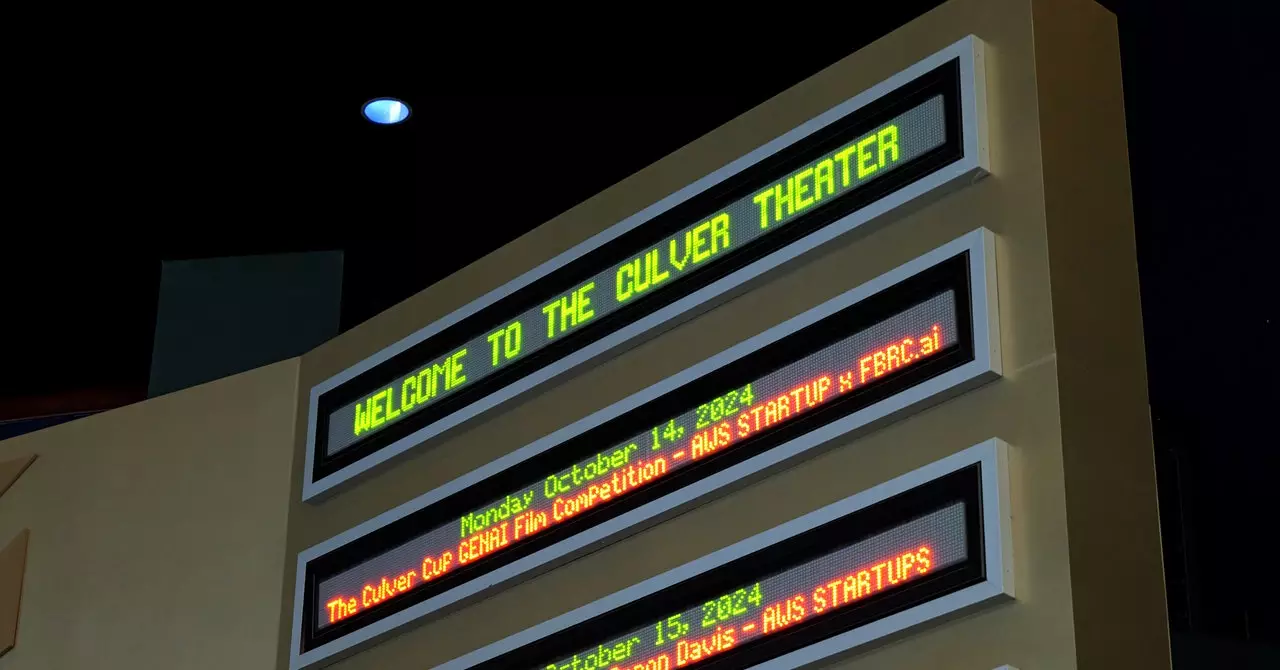In the rapidly evolving world of technology, the fundamentals of storytelling remain steadfast. A prominent voice in the industry, Meta Puppet, emphasizes that while the tools and technologies we employ in filmmaking may morph, the art of storytelling will persist. His recent short film, “Mnemonade,” underscores this principle, as he melds emotional depth with innovative technology to create a narrative that resonates. This film navigates themes of memory and loss, encapsulating the poignancy of an elderly woman’s struggle with fading recollections. By utilizing AI from ElevenLabs, Meta Puppet’s capacity to inhabit various characters showcases the potential of this technology when paired with a foundation rooted in genuine storytelling.
However, as filmmakers embrace artificial intelligence, a shadow of concern looms within Hollywood. Maddie Hong, a competitor in the Culver Cup finals alongside Meta Puppet, identifies the trepidation that stems from the potential legal ramifications and the risk of financial losses associated with AI creations. Her insights reflect a growing anxiety about unintended copyright infringement and the necessary continuity demanded by studio standards, especially as content is distributed across an array of platforms.
Despite these challenges, there lies an optimism about AI’s role in revitalizing a stagnated industry. Amit Jain, co-founder of Luma, posits that generative AI may grant traditional studios newfound flexibility with budgets and content diversity. Current trends in Hollywood show an over-reliance on existing franchises, primarily due to the safety imbued in familiar narratives. Thus, the ability of AI to enable lower-budget productions has the potential to diversify the storytelling landscape, allowing new and innovative ideas to flourish.
Yet, the promise of new opportunities does not erase the fears of job security in an industry profoundly affected by technological advancements. A survey of industry leaders revealed that 75 percent believe generative AI has already resulted in job reductions or consolidations. While the creation of new positions is acknowledged, the data unveils an ambiguous future—whether these roles can adequately offset losses remains in question.
The visual effects (VFX) sector exemplifies a microcosm of these broader concerns. Many artists express excitement about AI tools that streamline tedious workflows, yet they remain cautious about the ethical and financial ramifications. The tension between enthusiasm for innovative tools and apprehension about their implications reflects a broader conflict in the industry, challenging professionals to reconcile their artistic integrity with technological advancement.
As the dialogue around AI in filmmaking continues, it becomes clear that the intersection of skill and technology will define the future landscape. Meta Puppet’s analogy of generative AI to a piano underscores the importance of expertise. While anyone can access the tools, creating a masterpiece still requires the talent and understanding that only comes with diligent practice and experience. The talent pool may expand, but the quality will ultimately be shaped by those who can masterfully wield these tools.
For the future of cinema, this transition challenges us to consider how AI can serve as a collaborator rather than a replacement. By combining technology with the artistry of storytelling, filmmakers could pave the way for a new wave of creativity that honors traditional narratives while boldly venturing into uncharted territories. The potential for innovation is vast, yet the path forward must tread lightly, ensuring that while we embrace the new, we do not forsake the irreplaceable human touch that storytelling demands.
In this era of unprecedented technological advancement, the challenge will be to strike a delicate balance between embracing AI as a tool for innovation and preserving the art of storytelling that has captivated audiences for generations. As the industry grapples with these changes, it is crucial to engage in thoughtful discourse about the role of technology, legality, and creative integrity in shaping the future of filmmaking. Ultimately, it is the combination of innovative thinking and emotional storytelling that will determine the trajectory of this dynamic and evolving landscape.


Leave a Reply